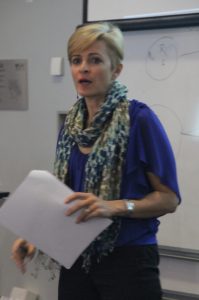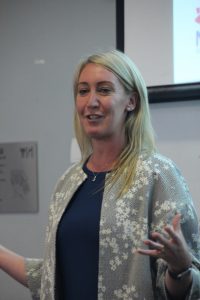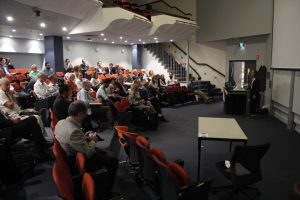The May seminar demonstrated how crowd-sourced data and multi-faceted travel demand management strategies are contributing to sustainable transport outcomes.
WalkSpot
Anthony Aisenberg from CrowdSpot presented on the WalkSpot project and demonstrated how a collaboration between Victoria Walks, CrowdSpot, and 15 Government organisations engaged the public to identify their walking safety hotspots. The Walkspot Interactive Archive Map is a powerful and lasting record of the crowd-sourced information about pedestrian perceptions of safety. The first iteration of its kind was the BikeSpot project which was similarly used to identify perceptions of cycling safety across Metropolitan Melbourne. Victoria Walks plans to use the WalkSpot results to target problem locations and disseminate information about Melbourne’s pedestrian infrastructure. You can read more about WalkSpot’s initial plight to target pedestrian hotspots via this article published in The Age.

You can watch Anthony’s presentation via the ITE Youtube channel, as well as the Q&A following his presentation. Anthony has also generously made his presentation available.
May Seminar: WalkSpot Presentation
Optus Sustainable Transport Strategy
Penny Dillon and Andrew Parker from Optus spoke about the integral role of Optus’ travel demand strategy to achieving sustainable and active transport targets together with a positive and engaged employee culture. Catalysed by relocation from the Sydney CBD to Macquarie Park, Optus identified the need to develop a Sustainable Transport Strategy to ensure its new location was both desirable and viable. Thus in 2007, Optus launched its Travel Plan, known as the Optus Sustainable Transport Strategy (OSTS). Some components of the Plan include frequent employee bus services, high quality pedestrian and cycle infrastructure and facilities on site, parking pricing, flexible work arrangements, ride-sharing discounts and car sharing initiatives. In their presentation, Andrew and Penny emphasises the importance of responsiveness to feedback, data, information provision, and high level support to the success of the program, which the continued high sustainable transport mode share to the Optus Campus attests to. A paper reflecting on the ten-year journey to success of the strategy can be viewed here.
Their presentation is also available to watch here.


Travel Choices – Transport for New South Wales
Rose McArthur (Mott MacDonald) presented on behalf of Transport for New South Wales, on the Travel Demand Management component of Tomorrow’s Sydney Strategy. The Strategy, known as Travel Choices. The TDM encourages behaviour change using the principles of Remode, Retime, Reduce and Reroute, to optimise the distribution of travel across Sydney’s transportation network. Travel Choices is designed to help with both the short term management of impacts stemming from mahor construction projects, as well as shaping long term travel patterns across Sydney. Rose also outlined how the principles underpinning Travel Choices have been pivotal in managing travel demand at major sporting events, the most recent example of which was the Gold Coast Commonwealth Games.
The video recording of the TfNSW presentation is available here, as are the slides.
May Seminar: TfNSW Travel Choices Presentation

A diverse crowd was engaged by the four passionate speakers, with fruitful conversations and questions following the presentations.




